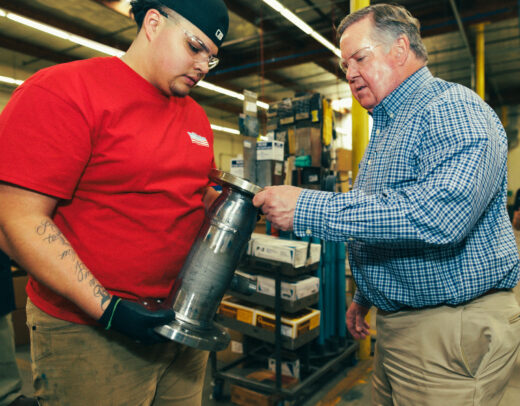
Editor’s note: On June 7, Riverside County will hold a primary to choose two candidates to face off in the November Gubernatorial Election for the U.S. Congressional District 41 seat. Five candidates are on the ballot. The Republicans are Rep. Ken Calvert, incumbent, and John Michael Lucino. Two candidates, Will Rollins and Shrina Kurani, are Democrats and Anna Nevenic, is registered as No Party Preference. The Town Crier was able to reach and interview four candidates. Interviews with these candidates are in this issue of the Town Crier. Lucino was the only candidate not interviewed.
Though he has 30 years’ experience in the House of Representatives, incumbent Congressman Ken Calvert is a new face for Hill voters. Current Rep. Dr. Raul Ruiz’s (D) newly drawn district no longer includes the Hill.
The 2020 California Redistricting Commission modified the boundaries of Calvert’s current 42nd District. It now stretches from Palm Springs and Palm Desert over the San Jacinto Mountains, including the Hill and Anza Valley, west to Menifee, Corona and Norco.
When asked about his feelings regarding the redistricting changes, Calvert replied, “Redistricting is supposedly independent and nonpartisan; it is what it is. But about 80% of the new district is part of my present district.” Most of the new communities are in the eastern portion of the district, including Anza, the Hill and the desert cities.
Calvert, 68, is a native of Corona and a graduate of San Diego State University. He was first elected to Congress in 1993. Since 2007, he has been a member of the House Appropriations Committee. He is the ranking Republican on the Appropriations Defense Subcommittee and also serves on the Energy and Water Subcommittee.
“Earmarks,” which legislators can employ to direct funds to specific projects within their districts, fell out of favor in the 2000s, but are returning to more use. Calvert favors them.
“They don’t increase the top line. And members of Congress know more about the state than officials in D.C. They are organically grown from the community,” he declared, “and must be very transparent.”
In the 2020 election, Calvert won with 57% of the vote. In his previous four elections, his vote total ranged from 56 to 65%.
Taxes are one of Calvert’s major issues. He favors lower tax rates but recognizes the need to collect revenues sufficient to pay for government services.
“We need a more efficient income tax system — fair and not overly burdensome,” he said. As a business owner, he is sensitive to corporate tax levels. While he does not favor eliminating the corporate income tax, he prefers a level that “… doesn’t’ stop exports or makes firms leave the U.S.” He argues that corporate tax cuts lead to more employment, which increases revenues overall.
Seventy percent of government spending is on “autopilot,” according to Calvert. “The only way to control it is through a budget agreement between the House and Senate and both sides of the aisle — Republicans and Democrats.”
Regarding health care policy, Calvert is strongly opposed to a single-payer system.
“It’s neither efficient nor effective. It doesn’t provide the quality of care that most Americans want,” he stated. “Competition in health care is good. We don’t need a major change to the health care system. People want to make their own decisions on doctors, hospitals and services. With a single-payer system, it’s difficult to assess the quality of doctors and effect your own health care preferences.”
Although Idyllwild, Pine Cove and the Hill are new parts of his district, Calvert is quite familiar with these communities. His parents were married here and lived on the Hill for five years before moving to Corona.
When he began serving on the Appropriations Committee, he was a member of the Interior and Environment Subcommittee. That presented him with several issues, such as wildfires and earthquakes, critical to life on the Hill.
“We have to have more money for these problems. We need better forest management. There’s a big reforestation backlog. We must clean up overgrown areas, go to prescribed burns, and remove dead and dying trees before fires start. Doing nothing is not the solution,” Calvert stressed.
He also has been involved in greater earthquake detection systems from the California border to Washington, he said, and discussed and explained the “Shake Alert” app for computers and phones.
In January, the Democratic Congressional Campaign Committee announced its targeted Republican seats, including Calvert’s. “While CA-41 was just barely carried by Donald Trump and Ken Calvert is out of step with his new district,” was their reasoning.
In March, former President Donald Trump endorsed Calvert’s reelection effort and also the Riverside County Sheriff’s Association.
On April 27, the Cook Political Report still listed this race as “likely Republican.”
“I’m worried about every election,” Calvert admitted. “Eighty percent of what I represent, people know me. I am taking nothing for granted.”
Through the end of March, Calvert had nearly $1.4 million cash in his campaign coffers, which is an increase of about $350,000 since the end of 2021. In comparison, at the end of September 2020, a month before the last election, he had about $640,000 in cash.
Contributions have come from numerous PACs and defense contractors. Nearly 50 were for $5,000.
And when the June reports are filed, Calvert expects the totals to be higher.










